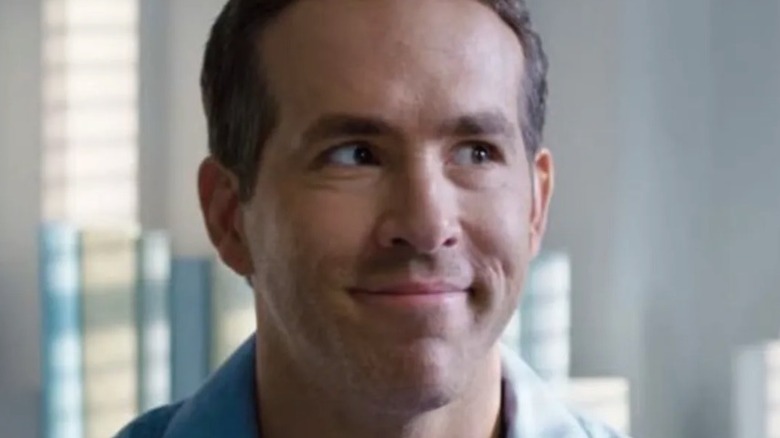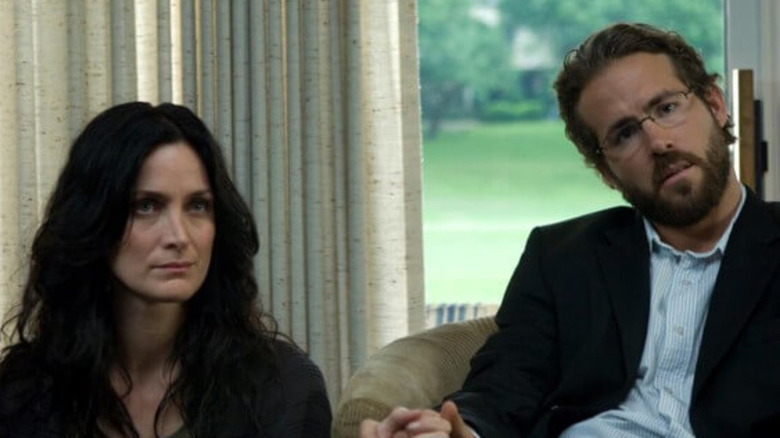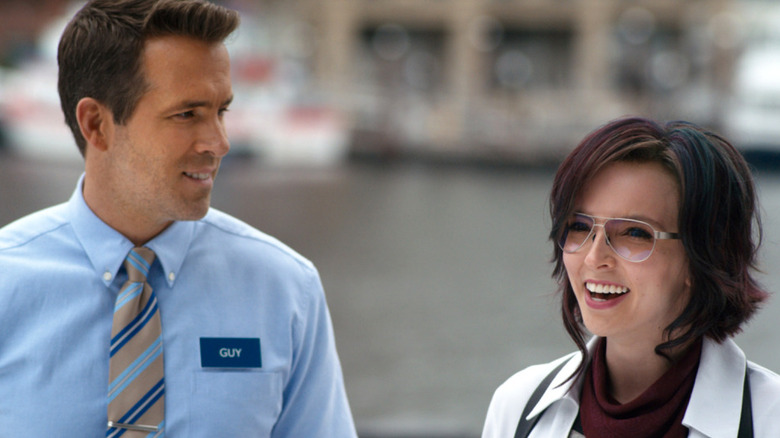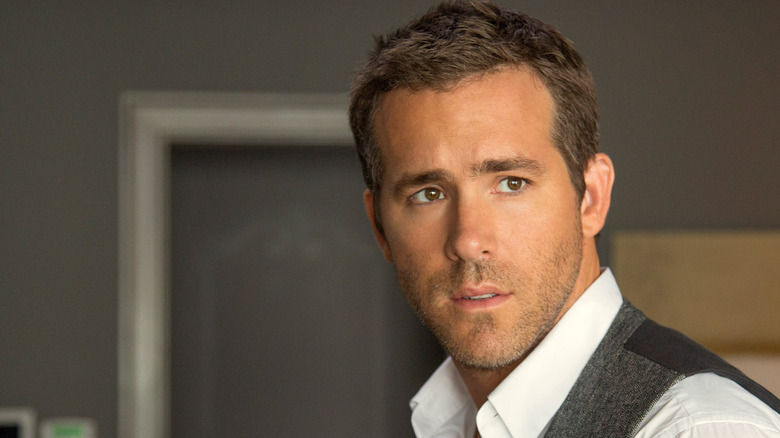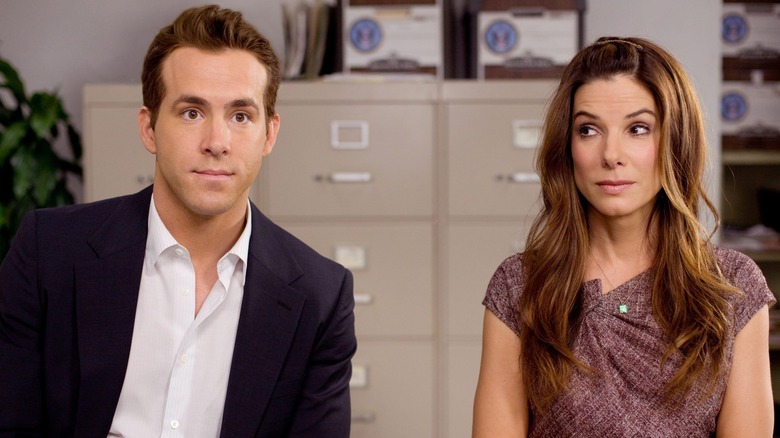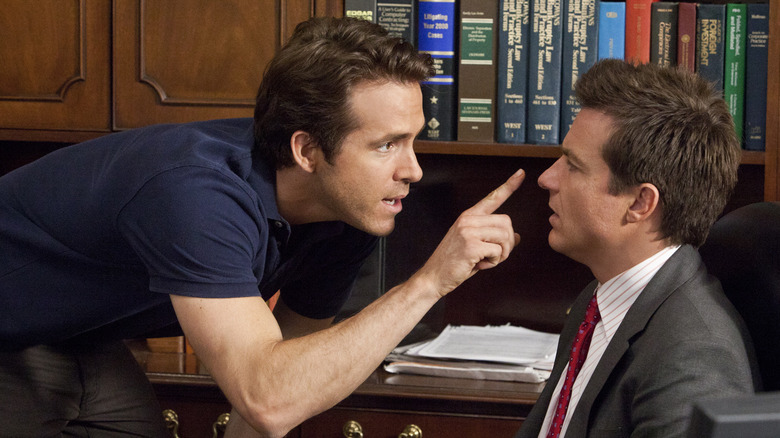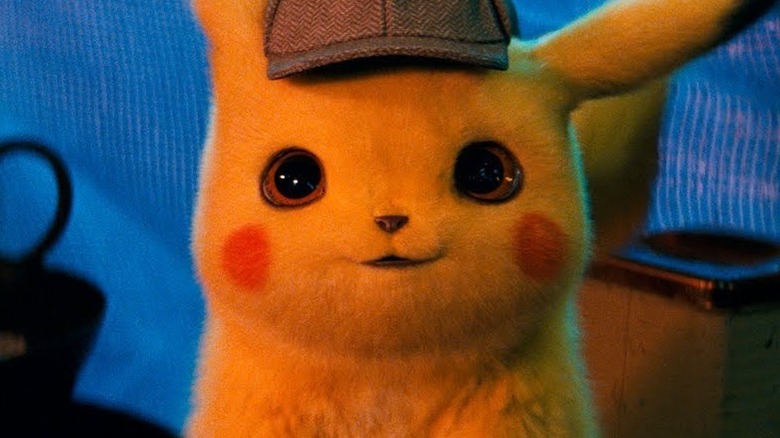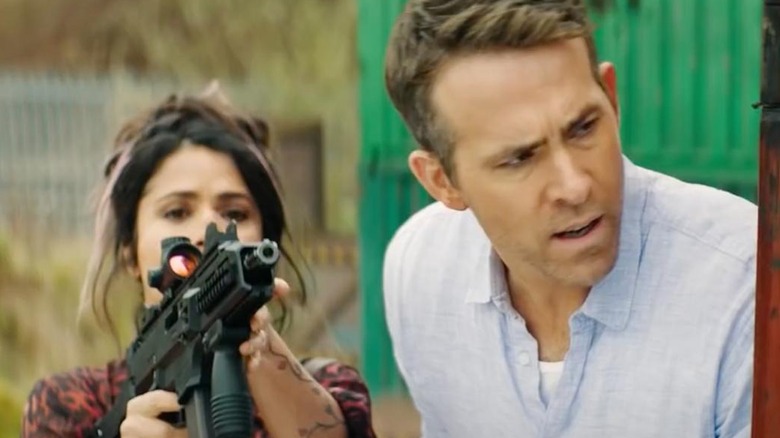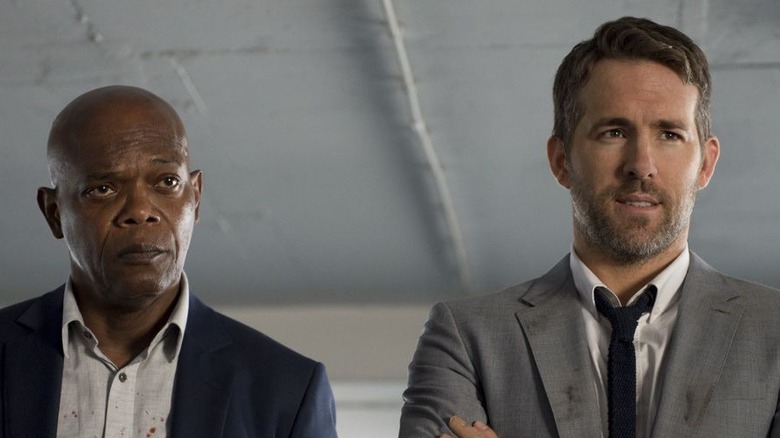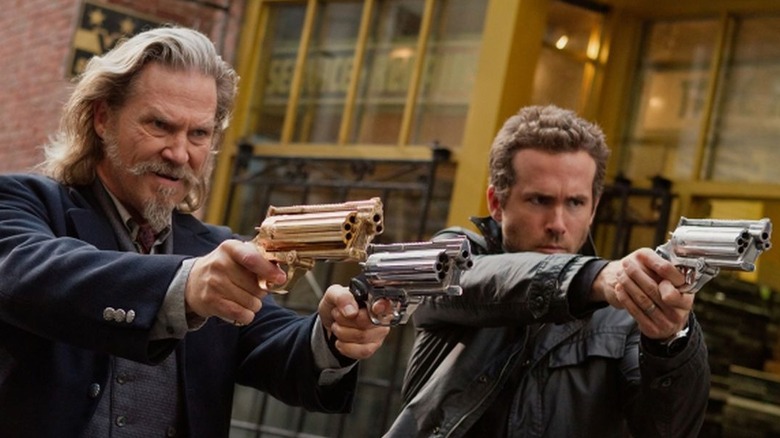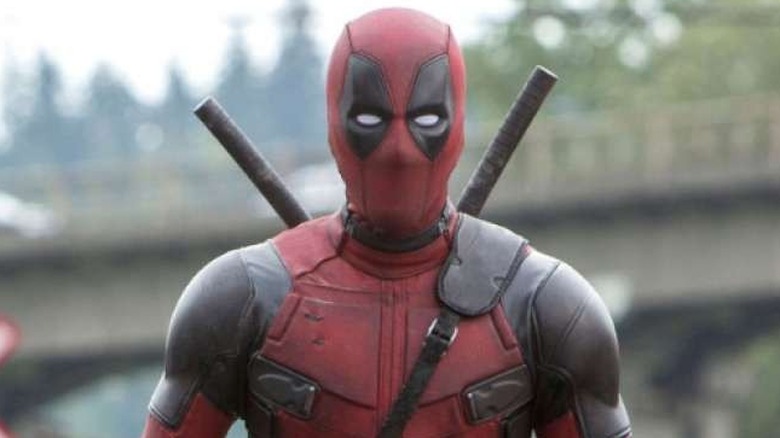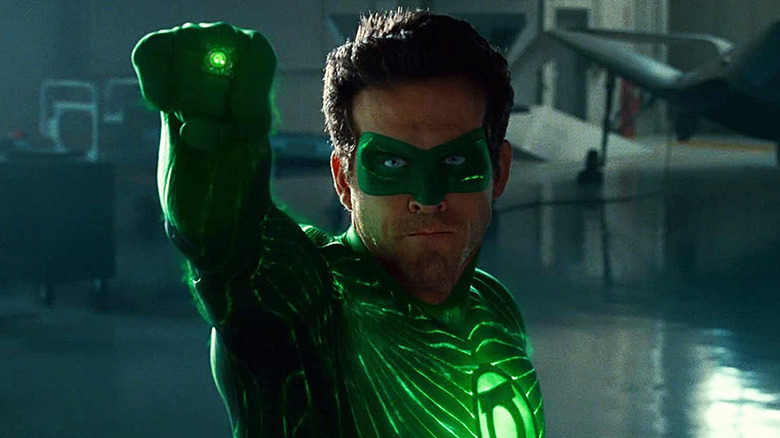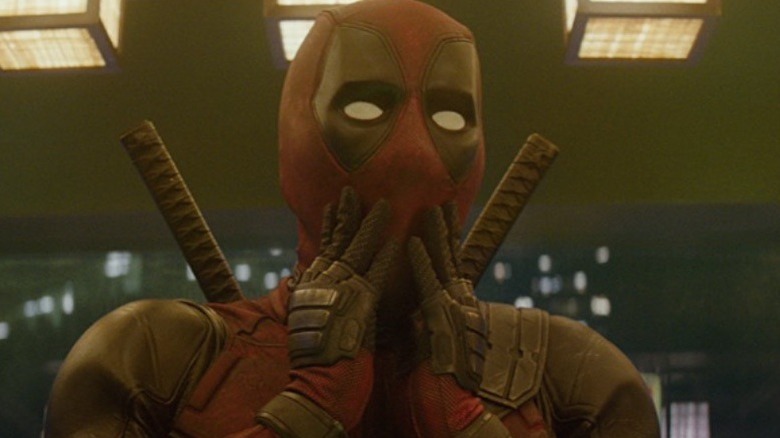Ryan Reynolds' Biggest Blockbusters And Biggest Bombs
Before Ryan Reynolds became "America's Favorite Canadian Ryan" (with all due respect to his fellow former Mouseketeer, Ryan Gosling) he was once going to become ... honestly, we're not sure. Next action star? He tried that in "Blade: Trinity," and it didn't work. Next Seann William Scott? "Van Wilder" was pretty popular, but just like the title character couldn't be a party boy forever, Reynolds couldn't play one forever either. Next king of romantic comedy? Kinda, but he was no challenger to Matthew McConaughey's romantic comedy crown.
Truth is, Reynolds was all of the above, and none of the above, which is why his film career floundered for more than a decade. Reynolds was in the dreaded spot of "everybody knows who this guy is, but nobody sees his movies." Reynolds was even considered "box office poison." Now? He's one of the few genuine "butts-in-seats" draws working in Hollywood today, with career earnings totaling $3.6 billion domestically and $6 billion worldwide. Sure enough, a big chunk of that change came in the past five years alone.
Reynolds' career is interesting, as many of his lowest-grossing movies also had modest budgets, so they still managed to make money. So this isn't a definitive countdown, but a compilation of his biggest hits — and misses. We'll also estimate his movies' profitability using the rule-of-thumb that a movie needs to double its budget to make money. Which movies make this list? Here are Ryan Reynolds' biggest blockbusters and biggest bombs!
Bomb: Fireflies In The Garden
If you look in the Encyclopedia of Oscar Bait Movies (it doesn't exist, but bear with us) under the "F" section, you'll see "Fireflies In The Garden." You certainly didn't see it in theaters. The turgid and trite melodrama about a Midwestern family whose old wounds come to the surface as they come together over tragedy (i.e. every one of these movies ever) earned a dreadful $3.5 million worldwide, only $35,000 of which came from the U.S. So on a $8 million budget, we estimate it lost more than $12 million. Not a studio or career killer, but not anything you'd want to highlight on your movie star resume.
Ryan Reynolds shouldn't shoulder all the blame for "Fireflies In The Garden" flopping, as he was part of a pretty impressive ensemble cast that included Willem Dafoe, Carrie-Anne Moss, Emily Watson, and Julia Roberts. However, none of them should be held individually or collectively responsible for this failure; "Fireflies In The Garden" is just an across-the-board bad movie, as evidenced by its 22% critics and 45% audience rating on Rotten Tomatoes.
Hit: Free Guy
"Free Guy" is undoubtedly one of Ryan Reynolds' most impressive achievements as a "butts-in-seats" draw. No, it didn't break any records or gross a billion dollars worldwide; it just easily defied even the rosiest of expectations. "Free Guy" isn't a super popular IP based on a pre-existing property, like 98.7% of the other successful summer movies that come out every year. Instead, it's just a fun, original movie with an interesting concept and starring a likable lead — you know, the way blockbuster movies used to be. Also, it opened during a pandemic, with moviegoers only trepidatiously venturing out to theaters. However, despite grading on a COVID curve, it still earned about what it would earn in normal moviegoing times. Credit Ryan Reynolds.
For context, "Free Guy" launched with a $28 million domestic debut (and about $45 million worldwide), more than the heavily hyped super-villain sequel "The Suicide Squad" ($26 million) and within $10 million of the much more high profile "Space Jam: A New Legacy" ($31 million) and "Jungle Cruise" ($35 million). And it did this without a built-in fan base; just Reynolds' mug on the poster. Not much more was needed. With an 82% critics' and 95% audience score on Rotten Tomatoes, "Free Guy" is one of the big winners from the summer of 2021 — and further proof of Ryan Reynolds' sui generis star power.
Bomb: All of 2015
Ryan Reynolds had a bad year at the box office in 2015, as he starred in not one, not two, but three huge bombs. We're hard pressed to think of any actor whose career survived back-to-back-to-back bombs in one year, let alone one who went on to become an A-list movie star. You have to admire Reynolds for his persistence — and his agent, who was still able to find him work after this run. Reynolds started 2015 with "The Voices" in February, which made $5,000 domestically (no, we didn't miss any zeroes) and $2.2 million worldwide. We don't know its budget, but unless it was made for much less than a million dollars (doubtful), we're betting it lost money.
Next was "Woman In Gold", which with $58 million worldwide on an $11 million budget ... actually made money. But that's more a matter of scale, as its $2 million opening wasn't anything to brag about. After that came "Self/Less," which lost money in theaters however you slice it, earning $33 million worldwide on a $26 million budget, a gap of about $19 million. Reynolds finished his terrible movie year with "Mississippi Grind," which made $448,641 worldwide. Again, we don't have access to its budget, but ... it only made $448,641! How was Reynolds able to keep working after his terrible 2015? Easy: his first movie in 2016 was "Deadpool." A worldwide gross of $784 million tends to heal a lot of wounds.
Hit: The Proposal
Before Ryan Reynolds became a draw on his own, he was a value-add in movies starring actors more bankable than him. Case in point, 2012's "Safe House," which earned $207 million worldwide on an $85 million budget, a profit of about $37 million. However, while Reynolds' name was above the title, this was clearly a Denzel Washington movie, as the poster is literally just a black and white photo of him. So basically the marketing was: "Here's the next Denzel Washington movie. Oh, and that Ryan Reynolds guy is in it too." So we're including "The Proposal" instead, as Reynolds was at least featured prominently on the poster and marketing.
Sure, "The Proposal" was obviously positioned as a Sandra Bullock rom-com, but it's fair to say moviegoers wouldn't have been as keen to see the film if her co-star was, say, Taylor Lautner or Armie Hammer. With Ryan Reynolds as Bullock's on-screen love interest, "The Proposal" earned $163 million domestically and $314 million worldwide on an economical $40 million budget, an estimated $234 million profit that once again proved casting Bullock is one of the best investments a movie studio can make. Casting Reynolds as her co-star was a smart move too.
Bomb: The Change-Up
Who doesn't love Jason Bateman? Don't tell us, we don't want to know. For that matter, who doesn't love Ryan Reynolds? Put them together and your movie should make money, right? Not so much. There's a difference between "I love that guy!" and "I'm willing to spend money to buy a ticket to see him." In 2011, Reynolds and Batemen were both clearly in the former category.
At this time, Reynolds was a reliable co-star in movies with bigger headliners like Denzel Washington and Sandra Bullock. Meanwhile, Bateman has always been that guy. Yes, Bateman is money in streaming series "Ozark," but on the big screen he has always been supporting more bankable movie stars like Will Smith in "Hancock" and Melissa McCarthy in "Identity Theft," or filling out ensemble films like "Horrible Bosses."
So "The Change-Up" simply didn't have enough star power to overcome it's unappealing "Freaky Friday ... but with dudes!" premise. It's downright dreadful 25% critics score and 47% audience score on Rotten Tomatoes certainly didn't help. "The Change-Up" earned $35 million domestically and $75 million worldwide. With a $52 million production budget, we estimate "The Change-Up" lost a lot of change, about $29 million.
Hit: Pokémon: Detective Pikachu
While Ryan Reynolds' main contribution to "Pokémon: Detective Pikachu" was his voice, he obviously deserves a big chunk of the credit for the film's success. For one, he received above-the-title billing in "Pokémon: Detective Pikachu," a rarity for voice actor work, so movie studio Warner Bros. obviously wanted to put him front and center in the film's promotion. For comparison, Ben Schwartz is nowhere in the promotion for "Sonic The Hedgehog," despite voicing the title character.
Secondly, and most significantly, "Pokémon: Detective Pikachu" was one of the few winners during the summer of 2019 when just about every blockbuster not distributed by Disney underperformed or flat-out flopped. For that matter, one of summer 2019's other non-Disney winners, "Hobbs and Shaw," featured Reynolds in an extended cameo. "Pokémon: Detective Pikachu" earned $144 million domestically and $431 million worldwide on a $150 million budget, a profit of about $131 million. Perhaps most impressively, it significantly outperformed the franchise's other big winners, "Pokémon: The First Movie" ($163 million worldwide) and "Pokémon 2000" ($133 million), despite those movies being released during the Pokémon series' peak in popularity. Yes, two decades of inflation made a difference; Ryan Reynolds made a bigger one.
Bomb: The Hitman's Wife's Bodyguard
Any movie released in 2020 or 2021 should be graded on a "COVID curve." However, even when grading on a curve, "The Hitman's Wife's Bodyguard" is still not very impressive. The film reunited the winning duo of Ryan Reynolds and Samuel L. Jackson from the 2017 film, adding Morgan Freeman and Antonio Banderas to the mix while boosting Salma Hayek's supporting role to lead. Despite the added star power, however, filmgoers weren't willing to mask up to see "The Hitman's Wife's Bodyguard" in theaters (unlike "Godzilla vs. Kong," "F9," "Black Widow," and "Free Guy").
The movie's terrible 25% critics' score on Rotten Tomatoes may have scared them away, though with a 79% audience score, the moviegoers who did go see the picture liked it better than critics. It's just that not many did. "The Hitman's Wife's Bodyguard" earned $38 million domestically and $64 million worldwide, a loss of about $76 million on a $70 million budget, and a massive 66% drop from the first film's $183 million worldwide. Despite our franchise-hungry film world, some movies just aren't meant to have sequels. "The Hitman's Wife's Bodyguard" was a huge bomb for Ryan Reynolds, no matter how you grade it.
Hit: The Hitman's Bodyguard
The record-breaking success of "Deadpool" in 2016 was a game changer for Ryan Reynolds' movie career. Similar to Johnny Depp as Captain Jack in the "Pirates of the Caribbean" movies or Robert Downey Jr. as Iron Man in the Marvel films, "Deadpool" showed that Reynolds could be a multi-million dollar movie star ... with the right character in the right IP. However, 2017's "The Hitman's Bodyguard" was equally impressive, as it showed that moviegoers weren't just willing to spend money to see Ryan Reynolds as "The Merc with a Mouth" — they wanted to see him, period.
Of course, having the "Most Valuable Player" of supporting actors in Samuel L. Jackson (one of the highest-grossing actors in the world) as your sparring partner doesn't hurt. "The Hitman's Bodyguard" nearly earned back its shockingly low $30 million budget in just three days with its $21 million opening weekend. The movie had legs, earning $75 million domestically and $183 million worldwide, bringing movie studio Lionsgate an estimated $123 million, and proving Ryan Reynolds was the real deal as a "butts-in-seats" movie star.
Bomb: R.I.P.D.
Here's the pitch: Pair a charismatic young lead with a well-respected veteran in an action-comedy where they battle supernatural threats with a secret organization. Are we describing "Men In Black" or "R.I.P.D."? Both. Just goes to show you how the line between blockbuster and bomb is razor thin. "Men In Black" is the franchise that Will Smith and Tommy Lee Jones powered to a combined $624 million domestically and $1.6 billion worldwide. Meanwhile, "R.I.P.D." teamed up Ryan Reynolds and Jeff Bridges in a failure so spectacular that its box office made "Men In Black: International" look like "Avatar."
It's hard to comprehend the scope of "R.I.P.D.'s" failure. For starters, its Rotten Tomatoes score is 12% from critics and 38% from audience's, meaning the only people who liked it only kinda liked it, or more likely wandered into the wrong theater and watched a different movie. Meanwhile, the movie opened in the middle of the 2013 summer movie season to $13 million, less than what even modest summer hits earn in one day (and what major blockbusters earn in an hour). It got worse. "R.I.P.D." earned $33 million domestically and $79 million worldwide on a baffling budget of $130 million, meaning it lost movie studio Universal an estimated $181 million. Supernatural action-comedy is a delicate balance, to be sure. While "Men In Black" soared, "R.I.P.D." was dead on arrival.
Hit: Deadpool
Sometimes all it takes is one role to completely turn an actor's career around. For Ryan Reynolds, that role was Wade Wilson, a.k.a. "The Merc with a Mouth," a.k.a. "Deadpool." However, 2016's "Deadpool" was actually the second time Reynolds played the character, as the first time was ... well, not good. Reynolds cameoed as Deadpool in 2009's (now non-canonical) "X-Men Origins: Wolverine" as a stone-cold, silent, final boss. While that movie earned $373 million worldwide, it didn't earn many fans — especially Reynolds' performance, which was, to put it simply, just not Deadpool. The much-anticipated standalone film seven years later fixed this in a big way.
"Deadpool" shocked the world when it opened to $132 million, still the biggest opening weekend ever for a R-rated movie. With an insanely economical $58 million budget, "Deadpool" more than made back its budget in three days alone, but finished its run with $363 million domestically and $784 million worldwide, scoring an estimated profit of $668 million. "Deadpool" more than doubled the box office of "X-Men Origins: Wolverine" not just because it satisfied disgruntled fans. It expanded the series' audience in a big way, giving moviegoers something dramatically different than what they'd seen before — an action-packed and thrilling superhero movie that was also a wry, sardonic, meta-commentary on the superhero genre itself. It was something only a character like "Deadpool" could deliver — and only Ryan Reynolds could play him.
Bomb: Green Lantern
Ryan Reynolds was born to play Deadpool, but playing Hal Jordan in "Green Lantern" could have killed his career. On paper, "Green Lantern" seemed to have a lot going for it, as it was directed by Martin Campbell, who re-launched the James Bond franchise twice, with "GoldenEye" and "Casino Royale," and also directed the well-regarded Zorro reboot "The Mask of Zorro." What went wrong? Everything. Studio interference, multiple rewrites and reshoots, Campbell and Reynolds not getting along, an expensive last-minute 3D conversion, and the fact that Campbell, a gifted action director, simply didn't understand (or even really like) CGI special effects.
The budget ballooned to a stupid $200 million, meaning this B-level DC character would need to earn Batman and Wonder Woman numbers to break even. He didn't. "Green Lantern" lost a lot of green, earning $116 million domestically and $219 million worldwide, for a loss of about $181 million. With massive bombs "Green Lantern" in 2011 and "R.I.P.D." in 2013, plus lots of smaller flops here and there, we're honestly surprised Reynolds was able to get work in anything other than community theater productions. "Green Lantern" wasn't a total loss, though. Reynolds married his co-star Blake Lively in 2012, a relationship that has produced three kids and countless sardonic social media posts. Hopefully, the engagement ring Reynolds gave her wasn't green.
Hit: Deadpool 2
While "Deadpool" changed Ryan Reynolds' career, the film's 2018 sequel takes the top spot for his highest-grossing movie worldwide. After "Deadpool" broke all the records for an R-rated comic book movie, Fox felt safe nearly doubling the sequel's budget to $110 million (still pretty modest by superhero blockbuster standards). At $125 million, the still huge opening of "Deadpool 2" was slightly below "Deadpool," and it also finished its domestic run a bit shorter than the first film too, with $324 million. However, its worldwide take of $786 million made it the highest-grossing R-rated movie of all time (until "Joker" stomped that record in 2019), and also earned Fox an estimated profit of $566 million.
The "Deadpool" films are also one of the few examples of spin-offs that became significantly more popular than their original series. Which is impressive, as the X-Men films are nothing to sneeze at. However, both "Deadpool" movies out-performed their closest rival in the X-Men franchise, 2014's "X-Men: Days of Future Past," by at least $100 million domestically, as well as $37 million worldwide. This is despite the fact that neither "Deadpool" movie features franchise stalwart Hugh Jackman as Wolverine, and both are rated R, limiting potential ticket buyers to ages 17 and over. You can debate which is the more impressive success, "Deadpool" or "Deadpool 2," but there's no denying they're both huge hits that turned "box office poison" Ryan Reynolds into a major movie star.
